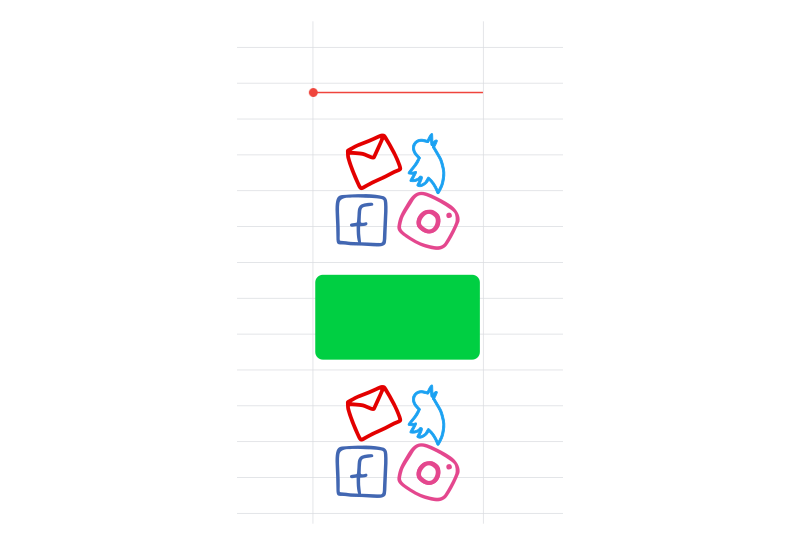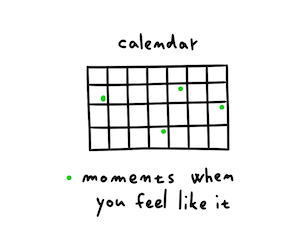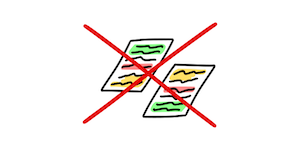Block out input-free time

How much time do you spend aimlessly scrolling? Looking for new and interesting information? Checking notifications, likes, or emails?
For many of us, the answer is hours every day. The question is: is that time well spent? Probably not.
Now, there's nothing wrong with occasionally watching a YouTube video or two in the evening (so long as it doesn't cut into your sleep schedule.) However, always seeking something new is not good for us.
Our screens have become addictive. They are visually stimulating, offering fast feedback for our actions. Tap and you're rewarded with infinite potentially interesting videos or games.
Worse, our screens control our behavior by controlling the choices presented to us.
The default choice architecture
When you have "nothing to do," what do you do?
You probably take your phone, or open the browser and are presented with choices. Facebook, Instagram, Twitter, TikTok, email,...
Here's why it's bad: those choices aren't designed to help you.
When we're presented with options, we choose from them. We rarely create our own additional and better options. That would take effort. We'd have to think. Our actions are guided by the interfaces we're looking at every day.
It's always easier to tap an icon and watch something than figure out what you need to do next. Yet, the latter is much better for us. The latter helps us make our lives better and easier in the future.
The missing apps
Here are some "apps" that you don't see when you're looking for something to do.
- Tidy up my room
- Take out the trash
- Wash the dishes
- Think about what you want to accomplish this year
- Re-decorate the room
- Stretch for a bit
- Set a goal and put it on a calendar
You don't see the above when you open your laptop or unlock your phone. That's a shame, because these actions would actually make your life a bit better, unlike doomscrolling.
What you see influences what you do. If you're not reminded of productive actions by your surroundings, you'll take unproductive actions instead, against your interests, just because they are the easiest choice at the moment.
When we're not using our computer to produce something or to connect with someone, our time is often better spent off-screen. Many on-screen actions are optimized to suck away our attention, not use it to improve our lives.
That's one argument for less screen time. Here's another one.
The catch-22 of digital distractions
You don't feel great. Your life is not like the life of the celebrities you see on social media. You feel bad about yourself. So you escape. You watch something. You scroll. You turn off your brain and let the memes and silly GIFs take over. It takes your mind off your life.
Then you get tired or you finally fall asleep, way too late, disrupting your sleep schedule.
The next day, you wake up and are back at square 0. You still don't feel that great about yourself...
Digital distractions are self-perpetuating misery machines.
Zombie mode: Low effort, low value entertainment
You don't feel great, so you choose to get distracted.
But then you become distracted, which causes you to not feel great. After all, you haven't made any real progress.
So the cycle continues.
You rarely get off the Internet feeling excited and ready to take on the world.
No, you feel distracted. Unsure what to do. Unfocused. That mental state is not great. And it's not useful.
That's what we call Zombie mode: passively consuming online media to get cheap dopamine.
Let's stop this cycle.
"How?" you ask.
Let your mind wander
The solution is simple: get away from screens.
With the arrival of information technologies, information has become less and less connected to our daily lives. In other words, less relevant.
The news, social media, and much of the Internet is utterly irrelevant to your life right now. You don't need more information, you need to do more with the information you already have.
And to do that, you need time to process it. Time to take the general lessons of others and figure out how you can implement them in your own life. Time to turn the information into action. Time to go from passive to active.
Unprocessed thoughts = heavy burden
When you've spent the whole day binging a Netflix show, then you won't have time to process the fact that you're getting out of shape, or that you've let your room be a mess, or that you still have not messaged John,... There's no time for left for it, you're always distracted. Always "not feeling like" doing what needs to be done.
Over time, unfinished business accumulates in our mind. Promises we've made, things we meant to do, requests from others.
When we don't create time to let all those things unwind in our mind and deal with them, they become a heavy burden in our mind.
Afraid of your thoughts?
When the unprocessed thoughts accumulate over long periods of time, they can turn into the fear of being alone with your own thoughts. The idea of thinking about what we need to deal with becomes so stressful that we want avoid it as much as we can.
We fill our time with podcasts, YouTube videos, Instagram scrolling, watching TikToks, and other passive activities because we fear the moments when our mind is free of external inputs.
The only moment when we're alone is when falling asleep or in a shower, and some people fill even those moments with music or podcasts.
Needless to say, this is terrible for us.
Most digital tools aren't suited for figuring things out
The problem is that our digital environment is not well suited to letting our mind wander and being intentional.
When you want to think, reflect, or figure things out, a screen is not your friend. (The one exception may be a blank screen of a distraction-free editor.)
To mull over your current circumstances and formulate what to do, go away from screens for an extended periods of time.
Create big chunks of time (1 hour or more) when you have "nothing to do." Create that space and then don't fill it with low-effort unproductive actions! Instead, let your mind be. Let yourself wander a bit. And then act on thoughts that are at least mildly productive.
Let yourself process the accumulated unfinished business. Unpack your baggage.
Here's one way to turn this into practice.
⏱ Block out an Input-free Hour
Set a timer for 60 minutes, and go away from any screens until the timer goes off.
Do anything, except for staring at screens. Don't consume any information from the outside, only from your own mind. No podcasts, no news, no social media. Tidy up, nap, go for a walk.
If you want to, write down some thoughts, but don't look of external information.
For 60 minutes, do not consume any more information, deal with the stuff already on your mind.
Put it on your calendar, or do it on the fly by setting a time.
You can try it right now. Stop reading. Set a timer for 1 hour on your phone, put your phone screen-side down and walk away from it.
Block out input-free time in your life
Let your mind wander.
Get away from time-sucking apps and do something offline that will make your life a bit better tomorrow, instead of waking up back at square 1 every day.
You don't need more information. You need to do more with the information you already have.



